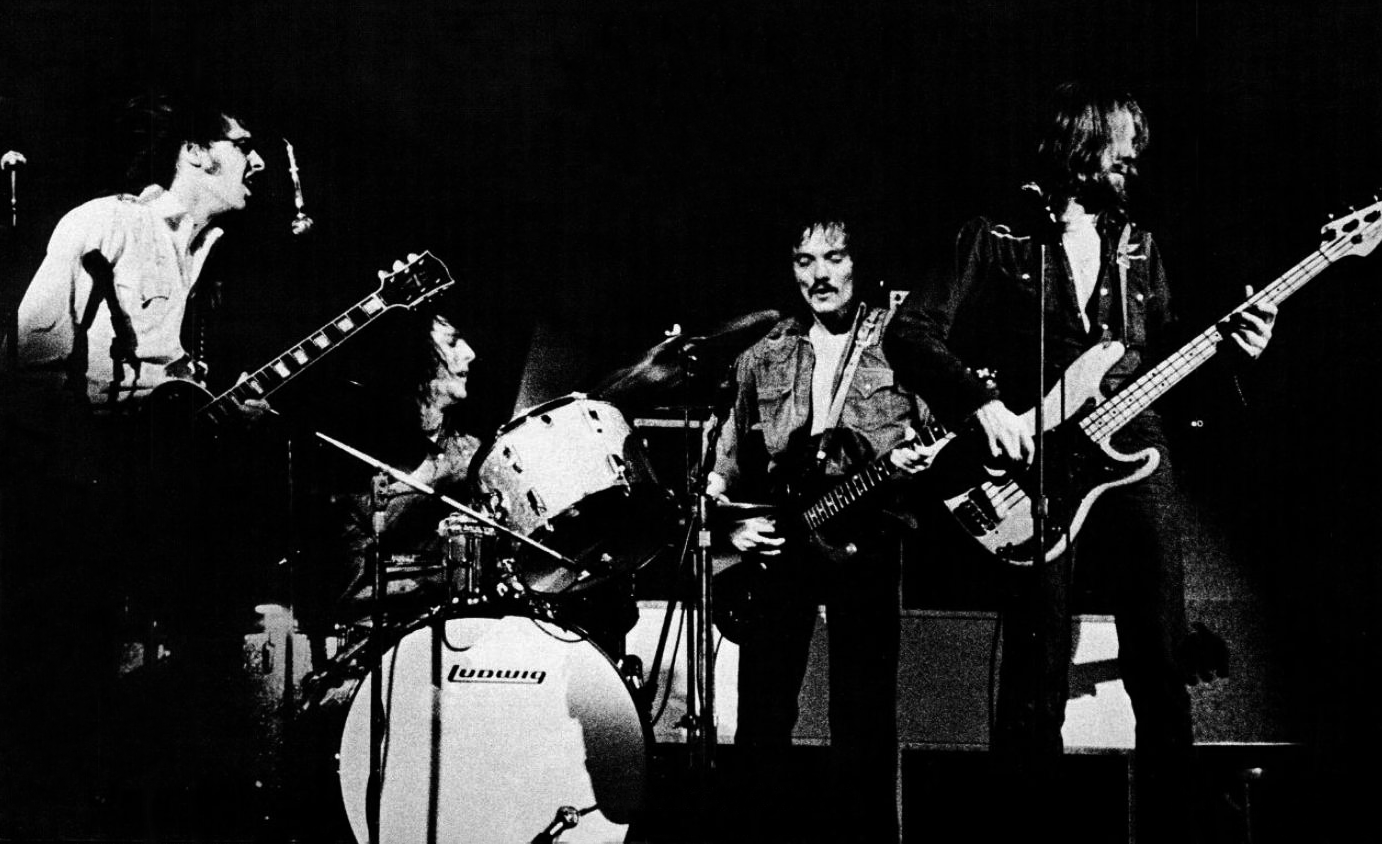Formation of the group
Humble Pie is regarded as one of the biggest influences for many rock and heavy metal groups.
Before the formation of Humble Pie, many of the members had played in previous bands. Guitarist and singer Steve Marriott had just left Small Faces, drummer Jerry Shirley had been a member of the mod band Apostolic Intervention, guitarist Peter Frampton had just come from Herd and Greg Ridley was a former Spooky Tooth member. Humble Pie was formed in early 1969.
Humble Pie’s first few months of existence were spent in Marriott’s Essex cottage where they continually jammed and practiced. Then they signed to Immediate Records (owned by ex-Rolling Stones manager Andrew Loog Oldham). Their debut single “Natural Born Bugie” peaked at #4 on the UK singles chart. It was quickly followed by the release of the single’s album (which was also their debut album) As Safe as Yesterday Is, which reached at #32 on the UK album chart.
Change of sound and Frampton’s departure
Later that same year, Humble Pie released their sophomore effort Town and Country, which was followed by a U.S. tour. When they went home, they found that Immediate had already folded due to bankruptcy. In 1970, the band signed with A&M Records and Dee Anthony became their new manager. Unbeknownst to Frampton, Dee and Marriott held a closed-door meeting where the manager suggested to Marriott that the band discard their current acoustic sound, which Frampton favored. Instead, they should adopt a grittier, more raucous and edgier sound to pull in more audiences especially in the US, which Dee was focusing on.
The band’s eponymous third album (first on A&M label) in 1970 marked that transition. In the album, Frampton’s gentler-sounding tracks like “Earth and Water Song” were juxtaposed by the louder, heavier and grittier songs such as “One Eyed Trouser Snake Rumba.” Their follow-up Rock On (1971) was to be the band’s last album with Frampton, as Humble Pie had fully embraced their raucous and heavy blues-based rock offering. Frampton’s role in the band was greatly waning.
Humble Pie embarked on a successful US tour that eventually produced their first live album Performance Rockin’ the Fillmore in 1971. It peaked at #21 on the Billboard 200 album chart and #32 on the UK album chart. After that tour, Frampton left to pursue a successful solo career.
Ex-Colosseum guitarist Dave “Clem” Clempson joined Humble Pie to fill in the void left by Frampton. Humble Pie’s sound grew even much heavier and darker with their 1972 LP Smokin’, which yielded the single “Hot ‘n’ Nasty” (#52, US).
In 1973, Humble Pie released their seventh album the double album Eat It, which combined studio and live recordings. Once again, it showed the band’s diversity with soul, blues, rock and roll and even funky elements. Eat It was a success, reaching #34 on the Billboard 200 and #13 on the UK album chart.
Recurring splits and re-formations, and a final split for good
However, their fortunes reversed when Thunderbox (1974) failed to reach the Top 40 of either US or UK charts. 1975’s Street Rats only managed a #100 position on the British album charts before falling away. Humble Pie disbanded soon afterward.
After their split, the former members of the group pursued separate projects. Shirley went on the form his own band Natural Gas, Clempson and Ridley formed their own act Strange Brew, while Marriott led another band Steve Marriott’s All-Stars and later joined Small Faces once more in their 1977 reunion.
In late 1979 (or early 1980), Marriott resumed Humble Pie, this time with Shirley and newer members with keyboardist Bobby Tench (formerly of The Jeff Beck Group) and American bassist Anthonly “Sooty” Jones. This lineup produced two albums: On To Victory (1980) and Go for the Throat (1981).
While the band was at the start of their 1981 spring tour to promote Go for the Throat, Marriott accidentally injured his hand when it was jammed in a hotel room door. This forced the band to cancel their scheduled gigs. Another case of bad luck continued for the front man and the band: Marriott later suffered an ulcer that also left the band with no choice but to cancel again their scheduled summer tour. Humble Pie again disbanded soon afterwards.
In 1982, Marriott teamed up with bassist/vocalist Jim Leverton, keyboardist Goldy McJohn (formerly of Steppenwolf) and drummer Fallon Williams III. Since then, because of some problems of the band members, the lineup constantly shifted. After aborted plans to record an album as well as failure in their attempts for another record deal, Steve disbanded Humble Pie anew in 1983. He returned to England afterwards, and plunged into seclusion.
Marriott and Peter Frampton reunited and started to work again in 1990. They produced a couple of records on their tentative collaboration, “The Bigger They Come” and “I Won’t Let You Down.” But a tragedy happened on April 20, 1991 when Marriott, at 44 years old, died in a fire which destroyed his Essex cottage.
Shirley mounted a concert in 2001 that commemorated Marriott’s 10th death anniversary; it was held at the London Astoria, and featured early band members. Shirley, who legally owned the Humble Pie name, got back to re-form the band once more in 2001 with Ridley, Tench, and a new guitarist Dave Colwell (formerly of Bad Company). This lineup released Back on Track in 2002. It would be the band’s last album as Ridley became ill, further cancelling the band’s future projects. Eventually the band split for good. Ridley died the following year of complications brought by pneumonia.
Since the band’s last split, there have been three Humble Pie compilations releases so far: The Atlanta Years (2005), The Definitive Collection (2006) andOne More For The Old Tosser (2006).

